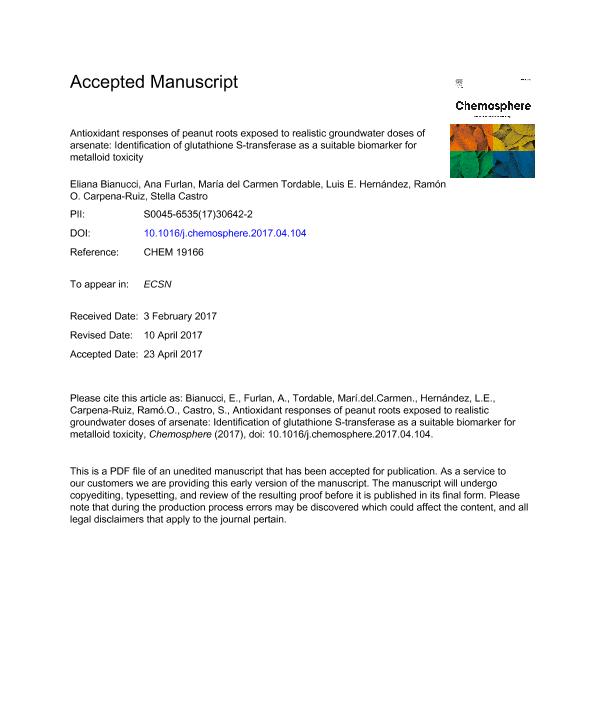Mostrar el registro sencillo del ítem
dc.contributor.author
Bianucci, Eliana Carolina

dc.contributor.author
Furlan, Ana Laura

dc.contributor.author
Tordable, Maria del Carmen

dc.contributor.author
Hernández, Luis E.
dc.contributor.author
Carpena Ruiz, Ramón O.
dc.contributor.author
Castro, Stella Maris

dc.date.available
2019-04-30T17:25:07Z
dc.date.issued
2017-08
dc.identifier.citation
Bianucci, Eliana Carolina; Furlan, Ana Laura; Tordable, Maria del Carmen; Hernández, Luis E.; Carpena Ruiz, Ramón O.; et al.; Antioxidant responses of peanut roots exposed to realistic groundwater doses of arsenate: Identification of glutathione S-transferase as a suitable biomarker for metalloid toxicity; Pergamon-Elsevier Science Ltd; Chemosphere; 181; 8-2017; 551-561
dc.identifier.issn
0045-6535
dc.identifier.uri
http://hdl.handle.net/11336/75346
dc.description.abstract
Arsenic (As)-polluted groundwater constitutes a serious problem for peanut plants, as roots can accumulate the metalloid in their edible parts. Characterization of stress responses to As may help to detect potential risks and identify mechanisms of tolerance, being the induction of oxidative stress a key feature. Fifteen-day old peanut plants were treated with arsenate in order to characterize the oxidative stress indexes and antioxidant response of the legume under realistic groundwater doses of the metalloid. Superoxide anion (O2[rad]−) and hydrogen peroxide (H2O2) histochemical staining along with the activities of NADPH oxidase, superoxide dismutase (SOD), catalase (CAT) and thiol (glutathione and thioredoxins) metabolism were determined in roots. Results showed that at 20 μM H2AsO4 −, peanut growth was reduced and the root architecture was altered. O2[rad]− and H2O2 accumulated at the root epidermis, while lipid peroxidation, NADPH oxidase, SOD, CAT and glutathione S-transferase (GST) activities augmented. These variables increased with increasing As concentration (100 μM) while glutathione reductase (GR) and glutathione peroxidase/peroxiredoxin (GPX/PRX) were significantly decreased. These findings demonstrated that the metalloid induced physiological and biochemical alterations, being the NADPH oxidase enzyme implicated in the oxidative burst. Additionally, the strong induction of GST activity, even at the lowest H2AsO4 − doses studied, can be exploited as suitable biomarker of As toxicity in peanut plants, which may help to detect risks of As accumulation and select tolerant cultivars.
dc.format
application/pdf
dc.language.iso
eng
dc.publisher
Pergamon-Elsevier Science Ltd

dc.rights
info:eu-repo/semantics/openAccess
dc.rights.uri
https://creativecommons.org/licenses/by-nc-nd/2.5/ar/
dc.subject
Arsenic
dc.subject
Glutathione S-Transferase
dc.subject
Oxidative Stress
dc.subject
Peanut
dc.subject.classification
Otras Ciencias Biológicas

dc.subject.classification
Ciencias Biológicas

dc.subject.classification
CIENCIAS NATURALES Y EXACTAS

dc.title
Antioxidant responses of peanut roots exposed to realistic groundwater doses of arsenate: Identification of glutathione S-transferase as a suitable biomarker for metalloid toxicity
dc.type
info:eu-repo/semantics/article
dc.type
info:ar-repo/semantics/artículo
dc.type
info:eu-repo/semantics/publishedVersion
dc.date.updated
2019-04-15T18:34:21Z
dc.journal.volume
181
dc.journal.pagination
551-561
dc.journal.pais
Estados Unidos

dc.description.fil
Fil: Bianucci, Eliana Carolina. Universidad Nacional de Río Cuarto. Facultad de Ciencias Exactas Fisicoquímicas y Naturales; Argentina. Universidad Autónoma de Madrid; España. Consejo Nacional de Investigaciones Científicas y Técnicas; Argentina
dc.description.fil
Fil: Furlan, Ana Laura. Universidad Nacional de Río Cuarto. Facultad de Ciencias Exactas Fisicoquímicas y Naturales; Argentina. Consejo Nacional de Investigaciones Científicas y Técnicas; Argentina
dc.description.fil
Fil: Tordable, Maria del Carmen. Universidad Nacional de Río Cuarto. Facultad de Ciencias Exactas Fisicoquímicas y Naturales; Argentina
dc.description.fil
Fil: Hernández, Luis E.. Universidad Autónoma de Madrid; España
dc.description.fil
Fil: Carpena Ruiz, Ramón O.. Universidad Autónoma de Madrid; España
dc.description.fil
Fil: Castro, Stella Maris. Universidad Nacional de Río Cuarto. Facultad de Ciencias Exactas Fisicoquímicas y Naturales; Argentina. Consejo Nacional de Investigaciones Científicas y Técnicas; Argentina
dc.journal.title
Chemosphere

dc.relation.alternativeid
info:eu-repo/semantics/altIdentifier/doi/http://dx.doi.org/10.1016/j.chemosphere.2017.04.104
dc.relation.alternativeid
info:eu-repo/semantics/altIdentifier/url/https://www.sciencedirect.com/science/article/pii/S0045653517306422
Archivos asociados
